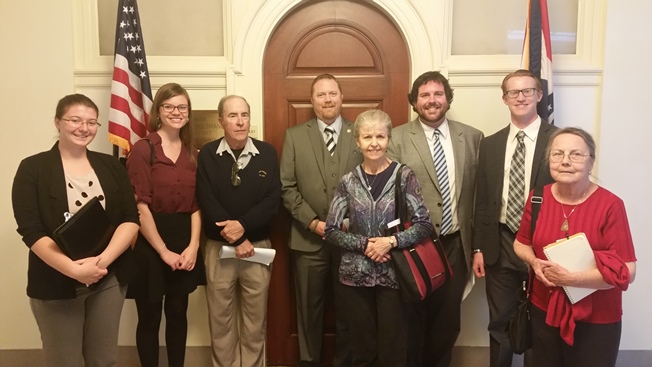MCE worked with the Missouri Parks Association and Audubon Missouri to stop many bad bills and to support a few good ones that were proposed this year in Jefferson City. MCE often traveled to Missouri’s capitol to testify on various bills, and we coordinated a citizen lobby day for people to meet their legislators. Our efforts made a difference, primarily related to state parks, but we couldn’t stop all the bad bills. Nonetheless, a few good bills made it across the finish line.

The good: Nearly all the $37 million cut by the House in various appropriations bills for state parks was restored by the Senate. Twenty-seven million dollars was restored for projects that are currently underway; $8 million was restored for new projects. These funds are needed to address infrastructure issues at state parks throughout Missouri, such as maintaining water and sewer systems, and maintenance for campsites, roads, and trails.
MCE and our partners were able to help stop bills that would have
-
Allowed ATV use on the Katy Trail (HB 2047)
-
Proposed a constitutional amendment to repeal the parks and soils sales tax and replace it with new version, requiring payment of property taxes by parks in perpetuity (HJR 101)
-
Shielded owners of a nuisance from legal action by their neighbors if the nuisance owner had a permit from the EPA, Corps of Engineers, or DNR (SB 894)
-
Required Missouri to sell 4,200 acres of land for a new state park along the Eleven Point River that the state had already purchased (HB 2187).
MCE and our allies also lended support to legislation that was signed into law by Gov. Jay Nixon. Good bills that passed include changes to how tax-increment financing (TIF) is approved that could limit floodplain development in the metro St. Louis area, including Stan Kroenke’s proposal for Maryland Heights (HB 1434). MCE also testified in favor of Rep. Jacob Hummel’s bipartisan farm-to-table bill that requires the Department of Agriculture to establish guidelines for institutions like schools, hospitals, nursing homes, and military bases to source at least 10 percent of their food locally by 2020. The previous goal of locally sourcing 5 percent of food for public schools was easily met, almost exclusively, through the purchase of local milk. Increasing the number of institutions involved and creating a goal of 10 percent for locally sourced food will help increase the amount of fruits and vegetables being bought from Missouri farmers.
The bad: Although we defended state parks with decent success, we did not do as well stopping bills that favor big agriculture operations that negatively affect water quality and public accountability. The Clean Water Commission (CWC) is currently made up of four members from the public, two from the agriculture and mining industry, and one from publicly owned wastewater treatment. Early in 2016, the CWC denied a permit for a concentrated animal feeding operation (CAFO) in Grundy County. The CWC has only denied one of the 521 permits granted or renewed by the Missouri Dept. of Natural Resources (DNR) since 2010. This one decision (4-2) unleashed a flurry of activity to change the authority and/or composition of the CWC during the legislative session. HB 1713, which was quietly amended at the end of the legislative session, changes the composition so that up to six members of the agriculture and mining industry are represented on the CWC with no guarantee for public representation.
Overhauling the CWC in favor of the factory farm industry because it was denied one permit out of 521 is simply outrageous. In his veto of HB 1713, Gov. Nixon said, “This change would effectively pave the way for regulated interests to seize control of the commission and would eliminate the public’s voice in the water quality control efforts under the purview of the commission.” We are currently advocating for the veto to be sustained.
Missouri’s factory farms also scored a win when HB 1414 passed with a slight veto-proof majority. The bill shields information shared by factor farmers participating in voluntary programs with the State of Missouri. The problem with the legislation is that the “voluntary programs” involve the distribution of taxpayer money. And now Missouri taxpayers will be unable to access information about farms and farmers receiving grants or financial assistance from the Department of Agriculture because those programs are voluntary. Animal disease programs are also voluntary. In his veto letter, Gov. Nixon wrote: “While it is deeply troubling that the General Assembly would erect such a comprehensive barrier to the public having access to information used by its government in the administration of programs funded by taxpayers, it is particularly offensive that this blanket of secrecy would apply to information submitted to programs that involve the awarding of public funds.” MCE is working to help sustain this veto as well.
We are awaiting the outcomes of the 2016 general election and are beginning to prepare for the 2017 legislative session. Your voice matters! It matters at the ballot box! It matters before, during, and after the legislative session, too! Please help MCE advance the environmental policies that you care about in 2017!
Get Engaged!
MCE is nearly through our first year working with an online advocacy tool called Engage. The Engage online advocacy tool allowed MCE to activate people throughout Missouri by providing the information necessary on important legislation so they could call their legislators and ask them to support or oppose bills. MCE will also use this tool in the near future for petition campaigns, and it will make it easy for people to submit comments to the Public Service Commission on important issues. We will employ Engage to keep you up-to-date on important bills related to water, energy, agriculture, and state parks. Many thanks to all of our supporters at the 2015 gala who helped us “engage” with generous donations to our Advocacy Auction.
